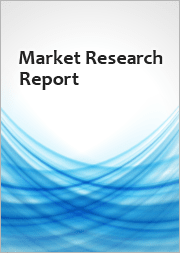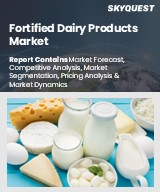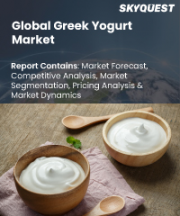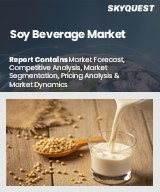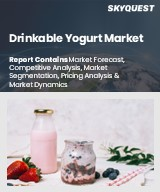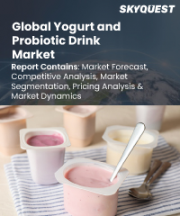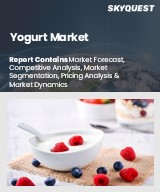
|
시장보고서
상품코드
1642840
요구르트 시장 규모, 점유율, 동향, 예측 : 제품 유형, 맛, 유통 채널, 지역별(2025-2033년)Yogurt Market Size, Share, Trends and Forecast by Product Type, Flavor, Distribution Channel, and Region, 2025-2033 |
||||||
요구르트 세계 시장 규모는 2024년에 1,274억 4,000만 달러에 달했습니다. IMARC Group은 향후 2033년에는 2,038억 달러에 이르고, 2025-2033년의 CAGR은 5.4%가 될 것으로 예측했습니다. 현재 유럽이 시장을 독점하고 있으며 2024년 시장 점유율은 33.6%를 넘었습니다. 장내 건강의 중요성에 대한 의식이 높아지고, 고단백 식품에 대한 급격한 기울기, RTE(Ready to Eat) 식품의 소비 확대 등이 시장을 추진하는 주요 요인 중 일부입니다.
요구르트는 우유를 특정 락토바실러스 불가릭스 균과 스트렙토코커스 써모필루스 균에서 발효시킴으로써 제조되는 유제품입니다. 요구르트는 우유를 일정한 온도로 가열한 후, 박테리아 배양물을 첨가하기 전에 냉각함으로써 제조될 수 있습니다. 단백질, 칼슘, 미네랄, 비타민 B12와 D와 같은 필수 영양소가 풍부하게 함유되어 있습니다. 또한 장의 건강을 촉진하는 유익한 박테리아인 프로바이오틱스도 포함되어 있습니다. 소화기계의 건강 증진, 뼈와 근육의 강화, 체중 관리의 촉진, 면역 체계의 강화, 전신의 건강 유지에 도움이 됩니다.
장내 건강의 중요성에 대한 지식 증가는 세계 요구르트와 같은 프로바이오틱스를 풍부하게 포함하는 식품의 채용을 촉진하고 있습니다. 게다가, 물약 제어를 용이하게 하는 1회분의 요구르트 컵을 쉽게 입수할 수 있는 것도, 시장의 성장을 뒷받침하고 있습니다. 게다가, 고단백 음식에 대한 지향 증가와 요구르트를 섭취함으로써 영양면에서의 이점에 관한 개인의 의식 증가는 시장에 긍정적인 영향을 미칩니다. 이와는 별도로 급속한 도시화, 바쁜 라이프스타일, 개인의 구매력 확대 등을 배경으로 요구르트를 기반으로 한 RTE(Ready to Eat) 식품과 음식의 소비가 증가하고 있는 것도 시장 성장에 기여하고 있습니다. 게다가 레크리에이션 스포츠, 피트니스, 운동 활동에 대한 개인 참여가 증가하고 있는 것도 세계 요구르트 수요를 자극하고 있습니다.
요구르트 시장 동향,촉진요인:
건강 지향 증가
요구르트 수요를 견인하는 가장 중요한 요인 중 하나는 건강과 복지에 대한 의식 증가입니다. 소비자는 균형 잡힌 식생활의 이점에 대해 잘 알고 있으며 요구르트는 종종 다른 스낵 과자를 대체하는 건강한 식품으로 홍보되는 경우가 많습니다. 단백질, 칼슘 및 프로바이오틱스가 풍부한 요구르트는 소화기계의 건강을 지원하고 필수 영양소를 제공합니다. 보다 건강한 라이프 스타일을 목표로 하는 사람이 늘어나면서 요구르트, 특히 당분이나 지방분이 적은 요구르트 수요가 대폭 증가하고 있습니다.
환경에 대한 관심 증가
환경의 지속가능성에 대한 관심 증가는 소비자에게 이산화탄소 배출량이 적은 식품을 선택하도록 촉구하고 있습니다. 고기와 다른 단백질 소스에 비해 요구르트 생산은 자원을 많이 소비하지 않는 것으로 간주되는 경우가 많습니다. 이러한 관점이 환경 의식이 높은 소비자들 사이에서 요구르트 수요를 밀어 올리고 있습니다. 게다가 유기농과 현지 생산 요구르트의 소비도 증가하고 있으며, 맛과 품질이 좋을 뿐만 아니라, 환경 의식이 높은 소비자에게도 어필하고 있습니다.
전자상거래 플랫폼 증가
전자상거래 플랫폼이 보급되어 소매점을 쉽게 이용할 수 있게 되면서 요구르트 구입은 과거 없을 만큼 단순해졌습니다. 소비자는 몇 번의 클릭만으로 원하는 유형과 맛을 구입하거나 식료품 쇼핑 중에 새로운 옵션을 찾을 수 있습니다. 정기 구매 서비스와 택배 편의성도 매출을 높이는 역할을 합니다. 실점포에서는 눈길을 끄는 디스플레이나 냉장 코너에 요구르트 제품을 전략적으로 배치하는 것으로, 충동 임베디드을 촉구해, 수요 증가에 더욱 기여하고 있습니다.
목차
제1장 서문
제2장 조사 범위와 조사 방법
- 조사의 목적
- 이해관계자
- 데이터 소스
- 1차 정보
- 2차 정보
- 시장 추정
- 상향식 접근
- 하향식 접근
- 조사 방법
제3장 주요 요약
제4장 소개
- 개요
- 주요 업계 동향
제5장 세계의 요구르트 산업
- 시장 개요
- 시장 실적
- 수량 동향
- 금액 동향
- COVID-19의 영향
- 가격 분석
- 주요 가격 지표
- 가격구조
- 가격 동향
- 시장 분석 : 제품 유형별
- 시장 분석 : 풍미별
- 시장 분석 : 유통채널별
- 시장 분석 : 지역별
- 시장 예측
- SWOT 분석
- 개요
- 강점
- 약점
- 기회
- 위협
- 밸류체인 분석
- 원재료 조달
- 제조
- 마케팅
- 유통
- 수출
- 최종 용도
- Porter's Five Forces 분석
- 개요
- 구매자의 협상력
- 공급기업의 협상력
- 경쟁도
- 신규 참가업체의 위협
- 대체품의 위협
- 주요 성공 요인과 위험 요인
제6장 시장 내역: 제품 유형별
- 고형 요구르트
- 시장 동향
- 시장 예측
- 그리스 요구르트
- 시장 동향
- 시장 예측
- 요구르트 음료
- 시장 동향
- 시장 예측
- 냉동 요구르트
- 시장 동향
- 시장 예측
- 기타
- 시장 동향
- 시장 예측
제7장 시장 분석 : 풍미별
- 딸기 블렌드
- 시장 동향
- 시장 예측
- 바닐라
- 시장 동향
- 시장 예측
- 일반
- 시장 동향
- 시장 예측
- 딸기
- 시장 동향
- 시장 예측
- 복숭아
- 시장 동향
- 시장 예측
- 기타
- 시장 동향
- 시장 예측
제8장 시장 분석 : 유통채널별
- 슈퍼마켓,하이퍼마켓
- 시장 동향
- 시장 예측
- 편의점
- 시장 동향
- 시장 예측
- 전문점
- 시장 동향
- 시장 예측
- 온라인 스토어
- 시장 동향
- 시장 예측
- 기타
- 시장 동향
- 시장 예측
제9장 시장 분석 : 지역별
- 아시아태평양
- 시장 동향
- 시장 예측
- 유럽연합
- 시장 동향
- 시장 예측
- 북미
- 시장 동향
- 시장 예측
- 동부 유럽
- 시장 동향
- 시장 예측
- 라틴아메리카
- 시장 동향
- 시장 예측
- 기타
- 시장 동향
- 시장 예측
제10장 경쟁 구도
- 시장 구조
- 주요 기업
제11장 요구르트의 제조 공정
- 제품 개요
- 상세한 프로세스 흐름
- 다양한 유형의 단위 조작
- 매스 밸런스와 원재료 요건
제12장 프로젝트의 상세·필요조건·비용
- 토지 요건과 비용
- 건설 요건과 비용
- 공장의 기계
- 기계 사진
- 원재료 요건과 지출
- 원재료와 최종제품의 사진
- 포장 요건과 지출
- 운송 요건과 지출
- 유틸리티 요건과 지출
- 인원 요건과 지출
- 기타 설비투자
제13장 대출과 자금 지원
제14장 프로젝트의 경제성
- 프로젝트의 자본 비용
- 기술 경제적 파라미터
- 공급 체인의 각 단계에서의 제품 가격과 마진
- 과세 및 감가상각
- 수입 예측
- 지출 예측
- 재무 분석
- 이익 분석
제15장 주요 기업 프로파일
- Lactalis Group
- General Mills Inc.
- Nestle
- Friesland Campina
- Danone
- Yili Industrial Group Co. Ltd.
The global yogurt market size was valued at USD 127.44 Billion in 2024. Looking forward, IMARC Group estimates the market to reach USD 203.8 Billion by 2033, exhibiting a CAGR of 5.4% during 2025-2033. Europe currently dominates the market, holding a market share of over 33.6% in 2024. The increasing awareness regarding the importance of gut health, sudden inclination towards high protein diets, and the growing consumption of ready to eat (RTE) food products are some of the major factors propelling the market.
Yogurt is a dairy product produced by fermenting milk with specific Lactobacillus bulgaricus and Streptococcus thermophilus bacteria. It can be prepared by heating milk to a certain temperature and then cooling it before adding the bacterial cultures. It is rich in protein, calcium, minerals, vitamins, such as B12 and D, and other essential nutrients. It also contains probiotics, which are beneficial bacteria that promote gut health. It aids in improving digestive health, strengthening bones and muscles, promoting weight management, enhancing the immune system, and maintaining overall health.
The increasing knowledge about the importance of gut health is driving the adoption of probiotic-rich foods like yogurt around the world. Moreover, the easy availability of single-serve yogurt cups that facilitate portion control is favoring the growth of the market. In addition, the growing inclination towards high protein diets and the increasing awareness among individuals about the nutritional benefits of consuming yogurt is influencing the market positively. Apart from this, the rising consumption of yogurt based ready to eat (RTE) food products and beverages on account of rapid urbanization, busy lifestyles, and expanding purchasing power of individuals is contributing to the market growth. Furthermore, the growing participation of individuals in recreational sports, fitness, and athletic activities is catalyzing the demand for yogurt worldwide.
Yogurt Market Trends/Drivers:
Increase in health consciousness
One of the most significant factors driving the demand for yogurt is the growing awareness about health and well-being. Consumers are becoming increasingly educated about the benefits of a balanced diet, and yogurt is often promoted as a healthy alternative to other snack items. Rich in protein, calcium, and probiotics, yogurt supports digestive health and offers essential nutrients. As more people aim to adopt healthier lifestyles, the demand for yogurt, especially those varieties with lower sugar and fat content, has seen a significant increase.
Rise in environmental concerns
A growing concern for environmental sustainability is encouraging consumers to opt for food products with a smaller carbon footprint. In comparison to meat and other protein sources, yogurt production is often seen as being less resource intensive. This perspective boosts its demand among eco-conscious consumers. Additionally, there is a rising consumption of organic and locally sourced yogurts, which not only offers better flavor and quality, but also appeals to those who are environmentally conscious.
Growing number of e-commerce platforms
The proliferation of e-commerce platforms and easy retail availability have made it simpler than ever to purchase yogurt. Consumers can buy their favorite types and flavors with just a few clicks, or discover new options while grocery shopping. Subscription services and the convenience of home delivery have also played a role in boosting sales. In physical stores, the strategic placement of yogurt products in eye-catching displays and refrigerated sections has encouraged impulse buying, further contributing to the rising demand.
Yogurt Industry Segmentation:
Breakup by Product Type:
Set Yogurt
Greek Yogurt
Yogurt Drinks
Frozen Yogurt
Others
Yogurt drinks dominate the market
Set yogurt is fermented and allowed to set in the container in which it is sold, which results in a firm texture. It retains all the whey, which makes it more moist and less concentrated than some other types. It is often used in cooking, as a snack or as a base for fruit and granola.
Greek yogurt is strained to remove the whey, which results in a thicker, creamier texture and higher protein content. Greek yogurt is popular for its rich flavor and is often eaten alone or used as a substitute for sour cream or mayonnaise in recipes. It also has less sugar and fewer carbohydrates compared to regular yogurt.
Breakup by Flavor:
Strawberry Blend
Vanilla
Plain
Strawberry
Peach
Others
Strawberry holds the largest share in the market
Vanilla-flavored yogurt is made by adding vanilla extract or vanilla bean to plain yogurt. It offers a smooth, aromatic flavor that is less tangy compared to fruit-flavored yogurts. This flavor pairs well with a variety of fruits and nuts and is often used in recipes.
Plain yogurt in its most basic form without any added flavors or sugar. It has a naturally tangy taste and offers the most health benefits as it is usually free from added sugars. It serves as a versatile base for creating your own flavors with fruits, honey, or spices.
Breakup by Distribution Channel:
Supermarkets and Hypermarkets
Convenience Stores
Specialty Stores
Online Stores
Others
Supermarkets and hypermarkets dominate the market
Specialty or gourmet stores offer a curated range of yogurt, often featuring organic, artisanal, or imported varieties. These stores appeal to consumers who are looking for specific types of yogurt, such as probiotic-rich or dairy-free options. The focus here is on quality and uniqueness rather than a wide range of choices.
Breakup by Region:
Asia Pacific
European Union
North America
Eastern Europe
Latin America
Others
Asia Pacific exhibits a clear dominance, accounting for the largest yogurt market share
The market research report has also provided a comprehensive analysis of all the major regional markets, which include Asia Pacific, European Union, North America, Eastern Europe, Latin America, and others. According to the report, Asia Pacific accounted for the largest market share.
The increasing consumer preference for organic and natural food products represents one of the primary factors driving the demand for yogurts in the Asia Pacific region. Moreover, the rising public awareness about the importance of maintaining overall health is favoring the growth of the market in the region. Besides this, the growing number of supermarkets and convenience stores in urban and semi-urban areas that provide easier access to a variety of yogurt products is influencing the market positively in the region.
Competitive Landscape:
The leading companies are incorporating advanced sensors and automation technologies to closely monitor the fermentation process, ensure consistency in taste and texture, and enable large-scale production without compromising quality. They are also using advanced biotechnology methods to incorporate specific strains of probiotics that can survive the acidic environment of the stomach, thereby offering targeted health benefits. Moreover, key players are adopting the usage of sustainable packaging materials, such as plant-based plastics and biodegradable materials and smart packaging, which features QR codes and NFC chips and allows consumers to access information about the origin, ingredients, and nutritional facts of the product via smartphones.
The report has provided a comprehensive analysis of the competitive landscape in the market. Detailed profiles of all major companies have also been provided. Some of the key players in the market include:
Lactalis Group
General Mills Inc.
Nestle
Friesland Campina
Danone
Yili Industrial Group Co. Ltd.
Key Questions Answered in This Report
- 1. What is yogurt?
- 2. How big is the global yogurt market?
- 3. What is the expected growth rate of the global yogurt market during 2025-2033?
- 4. What are the key factors driving the global yogurt market?
- 5. What is the leading segment of the global yogurt market based on the product type?
- 6. What is the leading segment of the global yogurt market based on flavor?
- 7. What is the leading segment of the global yogurt market based on distribution channel?
- 8. What are the key regions in the global yogurt market?
- 9. Who are the key players/companies in the global yogurt market?
Table of Contents
1 Preface
2 Scope and Methodology
- 2.1 Objectives of the Study
- 2.2 Stakeholders
- 2.3 Data Sources
- 2.3.1 Primary Sources
- 2.3.2 Secondary Sources
- 2.4 Market Estimation
- 2.4.1 Bottom-Up Approach
- 2.4.2 Top-Down Approach
- 2.5 Forecasting Methodology
3 Executive Summary
4 Introduction
- 4.1 Overview
- 4.2 Key Industry Trends
5 Global Yogurt Industry
- 5.1 Market Overview
- 5.2 Market Performance
- 5.2.1 Volume Trends
- 5.2.2 Value Trends
- 5.3 Impact of COVID-19
- 5.4 Price Analysis
- 5.4.1 Key Price Indicators
- 5.4.2 Price Structure
- 5.4.3 Price Trends
- 5.5 Market Breakup by Product Type
- 5.6 Market Breakup by Flavor
- 5.7 Market Breakup by Distribution Channel
- 5.8 Market Breakup by Region
- 5.9 Market Forecast
- 5.10 SWOT Analysis
- 5.10.1 Overview
- 5.10.2 Strengths
- 5.10.3 Weaknesses
- 5.10.4 Opportunities
- 5.10.5 Threats
- 5.11 Value Chain Analysis
- 5.11.1 Raw Material Procurement
- 5.11.2 Manufacturing
- 5.11.3 Marketing
- 5.11.4 Distribution
- 5.11.5 Exports
- 5.11.6 End-Use
- 5.12 Porter's Five Forces Analysis
- 5.12.1 Overview
- 5.12.2 Bargaining Power of Buyers
- 5.12.3 Bargaining Power of Suppliers
- 5.12.4 Degree of Competition
- 5.12.5 Threat of New Entrants
- 5.12.6 Threat of Substitutes
- 5.13 Key Success Factors and Risk Factors
6 Market Breakup by Product Type
- 6.1 Set Yogurt
- 6.1.1 Market Trends
- 6.1.2 Market Forecast
- 6.2 Greek Yogurt
- 6.2.1 Market Trends
- 6.2.2 Market Forecast
- 6.3 Yogurt Drinks
- 6.3.1 Market Trends
- 6.3.2 Market Forecast
- 6.4 Frozen Yogurt
- 6.4.1 Market Trends
- 6.4.2 Market Forecast
- 6.5 Others
- 6.5.1 Market Trends
- 6.5.2 Market Forecast
7 Market Breakup by Flavor
- 7.1 Strawberry Blend
- 7.1.1 Market Trends
- 7.1.2 Market Forecast
- 7.2 Vanilla
- 7.2.1 Market Trends
- 7.2.2 Market Forecast
- 7.3 Plain
- 7.3.1 Market Trends
- 7.3.2 Market Forecast
- 7.4 Strawberry
- 7.4.1 Market Trends
- 7.4.2 Market Forecast
- 7.5 Peach
- 7.5.1 Market Trends
- 7.5.2 Market Forecast
- 7.6 Others
- 7.6.1 Market Trends
- 7.6.2 Market Forecast
8 Market Breakup by Distribution Channel
- 8.1 Supermarkets and Hypermarkets
- 8.1.1 Market Trends
- 8.1.2 Market Forecast
- 8.2 Convenience Stores
- 8.2.1 Market Trends
- 8.2.2 Market Forecast
- 8.3 Specialty Stores
- 8.3.1 Market Trends
- 8.3.2 Market Forecast
- 8.4 Online Stores
- 8.4.1 Market Trends
- 8.4.2 Market Forecast
- 8.5 Others
- 8.5.1 Market Trends
- 8.5.2 Market Forecast
9 Market Breakup by Region
- 9.1 Asia Pacific
- 9.1.1 Market Trends
- 9.1.2 Market Forecast
- 9.2 European Union
- 9.2.1 Market Trends
- 9.2.2 Market Forecast
- 9.3 North America
- 9.3.1 Market Trends
- 9.3.2 Market Forecast
- 9.4 Eastern Europe
- 9.4.1 Market Trends
- 9.4.2 Market Forecast
- 9.5 Latin America
- 9.5.1 Market Trends
- 9.5.2 Market Forecast
- 9.6 Others
- 9.6.1 Market Trends
- 9.6.2 Market Forecast
10 Competitive Landscape
- 10.1 Market Structure
- 10.2 Key Players
11 Yogurt Manufacturing Process
- 11.1 Product Overview
- 11.2 Detailed Process Flow
- 11.3 Various Types of Unit Operations Involved
- 11.4 Mass Balance and Raw Material Requirements
12 Project Details, Requirements and Costs Involved
- 12.1 Land Requirements and Expenditures
- 12.2 Construction Requirements and Expenditures
- 12.3 Plant Machinery
- 12.4 Machinery Pictures
- 12.5 Raw Material Requirements and Expenditures
- 12.6 Raw Material and Final Product Pictures
- 12.7 Packaging Requirements and Expenditures
- 12.8 Transportation Requirements and Expenditures
- 12.9 Utility Requirements and Expenditures
- 12.10 Manpower Requirements and Expenditures
- 12.11 Other Capital Investments
13 Loans and Financial Assistance
14 Project Economics
- 14.1 Capital Cost of the Project
- 14.2 Techno-Economic Parameters
- 14.3 Product Pricing and Margins Across Various Levels of the Supply Chain
- 14.4 Taxation and Depreciation
- 14.5 Income Projections
- 14.6 Expenditure Projections
- 14.7 Financial Analysis
- 14.8 Profit Analysis
15 Key Player Profiles
- 15.1 Lactalis Group
- 15.2 General Mills Inc.
- 15.3 Nestle
- 15.4 Friesland Campina
- 15.5 Danone
- 15.6 Yili Industrial Group Co. Ltd.





